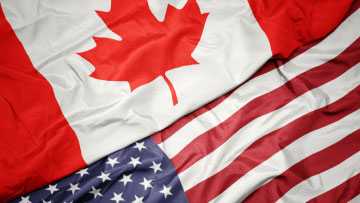Canada's response to U.S. tariffs on Canadian goods
Throughout Canada's negotiations with the United States (U.S.) on a new trade and security relationship, the Government of Canada's approach has been to protect Canadian workers and businesses, and to incentivize a negotiated settlement with the U.S.
Most requested
- Full list of U.S. products subject to counter tariffs as of September 1, 2025
- Support for businesses and workers
On this page
Related news from the Prime Minister
- Support for Canadian strategic industries (September 5, 2025)
- PM Statement on Canada-U.S. trade (August 22, 2025)
- Support for Canada's softwood lumber industry (August 5, 2025)
- Support for Canada's steel industry (July 16, 2025)
Countermeasures in response to U.S. tariffs
In recognition of the U.S.'s approach to allow most Canadian goods to enter the U.S. tariff-free under the Canada-United States-Mexico Agreement (CUSMA), Canada is removing counter tariffs put in place in March 2025 on most U.S. imports, effective September 1, 2025.
Canada's counter tariffs on steel, aluminum and automobiles remain in effect as intensive negotiations with the U.S. continue. This is in recognition that the U.S. maintains tariffs on these sectors, without providing an exemption for CUSMA-compliant goods.
Find U.S. products subject to counter tariffs
-
Full list of U.S. products subject to counter tariffs
All U.S. products subject to counter tariffs have been combined into one easy-to-use, searchable table.
- Locate the individual lists of affected U.S. products under each related countermeasure announcement below.
Countermeasure announcements
Helping Canadian businesses and workers
The Government of Canada understands the concern of many Canadians as a result of the tariffs imposed by the U.S. and is committed to using every tool at its disposal to protect Canadian businesses and workers.
Support for businesses and workers
Canada's robust system of economic support programs is available to help businesses and workers directly impacted by U.S. tariffs.
Choose Canada
Find information on Made in Canada labels, how to buy Canadian and the benefits of shopping and travelling in Canada.
The government is also taking steps to mitigate the impact of Canada's tariff countermeasures on Canadian workers and businesses.
- Tariffs (with the exception of steel products) are automatically waived where goods are used for specified non-commercial or commercial uses (e.g., as inputs to automobile or aircraft manufacturing), as outlined in Chapter 98 and Chapter 99 of the Customs Tariff.
- Companies can apply for the Canada Border Services Agency Duties Relief Program and Duty Drawback Program to import commercial goods without paying tariffs, or receive a refund for tariffs paid, where goods are eventually exported.
- The government has also established a remission process to consider requests for exceptional relief from Canadian tariffs on U.S. goods.
- On April 16, the United States Surtax Remission Order (2025) entered into force. This action provides time-limited immediate relief for imports from March 4, 2025 until October 15, 2025 to a broad cross-section of Canadian businesses that rely on U.S. inputs to support their competitiveness as well as to entities integral to Canadians’ health and safety, such as hospitals, long-term care facilities and fire departments.
Impacts of unjustified U.S. trade actions
Canada and the United States have the world's most comprehensive and dynamic trading relationship, which supports millions of jobs in both countries. We are each other's largest trading partners with US$2.5 billion worth of goods and services crossing the border every day.
Canadian countermeasures are about protecting and defending Canada's interests, consumers, workers, and businesses.
How this affects individuals
The U.S. tariffs will impact Canadians and Americans alike. They will increase costs for consumers, put thousands of jobs at risk, and weaken North America's competitiveness in the global economy. Tariffs will upend production at U.S. auto assembly plants, and raise costs for American consumers, whether for products made in Canada or U.S.-made products that use Canadian materials, putting American prosperity at risk.
At the same time, to help reduce the financial burden on Canadian consumers as a result of higher prices for American products, the Government of Canada encourages Canadian consumers to switch from purchasing American products to those made in Canada. This will also help support Canadian businesses by increasing their domestic sales, especially if their exports are impacted by U.S. tariffs.
How this affects businesses
Canadian companies that rely on cross-border supply chains will face logistical and financial challenges. Businesses will likely see reduced demand from U.S. buyers due to increased prices, slowing overall economic growth in Canada.
With many U.S. businesses relying on Canadian imports, tariffs on Canadian goods and materials will raise prices considerably for American businesses and consumers, leading to inflationary pressures in the U.S. Tariffs will also disrupt American supply chains, which could cause delays and increased costs, making American-made products more expensive.
Due to the sudden uncertainty around trade relations, businesses on both sides of the border could delay investments, further slowing growth.
Canadian customs information for businesses
Featured

Canada's engagement with the United States
Canada’s proactive approach to its relationship with the United States. Find resources and information on key challenges including trade, tariffs, bilateral relations and exporting support for Canadian businesses.

Strengthening border security
Canada's plan to strengthen, secure and efficiently manage our borders.
